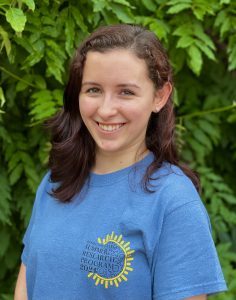What’s in a name? Summer research analyzing the role brand affiliation plays in hotel industry

Ariadne Pojedinec ’22
This story is part of an ongoing series featuring the work of faculty and students participating in Randolph’s Summer Research Program.
Randolph College’s Summer Research Program began May 17. But for Ariadne Pojedinec ’22, it’s been several months in the making.
She’s spent most of the spring semester learning how to use Python, a programming language popular among data scientists. It will play a key role in the work she’s doing this summer with business and economics professor ATM Sayfuddin.
“It’s opened up a completely different world,” said Pojedinec, an economics major. “I never thought I’d be interested in learning about programming languages. I came to college thinking I was only going to write papers and never do anything with math.”
This summer, she and Sayfuddin are studying the role brand affiliation plays in the hotel industry, a project that grew out of Sayfuddin’s previous research.
“One of my early research topics involved the hotel industry, looking at how green hotels performed as opposed to other non-green hotels,” he said. “As I moved along with that focus, I noticed some hotels in the data set had changed ownership. With ownership changes, the brand of some of the hotels changed. That piqued my interest. If the brand changes, does that impact the hotel’s revenue or any other performance outcomes?”
They’re also looking at how various hotel features, such as location and market segments, interact in the brand-revenue relationship, with controls in place for observed hotel features and quality.
The data, previously collected by Sayfuddin, all comes from Texas, where hotels are required to report monthly or quarterly revenues related to occupancy taxes.

ATM Sayfuddin
He also gathered data about hotels’ rebrandings and closures from a market research company, and about amenities they offer from TripAdvisor.com.
Ultimately, it amounts to information from tens of thousands of hotels. That’s where Python and other data analytics tools come in.
They’re exploring the data now to answer questions about how many hotels have rebranded and how often, how long each brand has lasted there, and why hotel owners choose to change their brands. From there, they’ll merge the data sets and run them through various models to see if the rebrandings had an impact and, if so, how much of one.
Going into the program, Sayfuddin looked for a student with both programming knowledge and an interest in econometrics, the use of statistics to answer economic questions.
Pojedinec, whose work ethic had impressed him in a previous class, fit the bill. She also had a natural curiosity he knew would come in handy.
“It’s a great opportunity,” she said. “And it’s a topic I’d never really thought of before. I wanted to dive in and understand it more.”
Tags: ATM Sayfuddin, business, economics, student faculty research, summer research, summer research 2021
